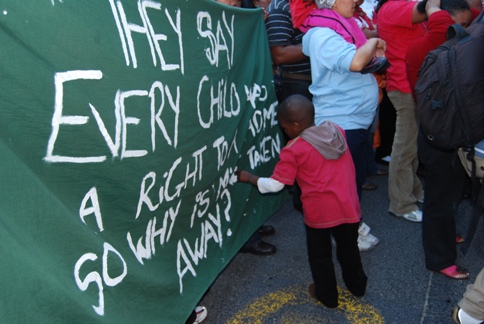By: Jared Sacks
A couple of months ago, CHOSA hosted two book launches and fundraisers in Los Angeles and Santa Barbara, CA, to promote a unique book written by one of the CHOSA-supported communities in Cape Town, South Africa. These were very successful events where a number of books were sold and more than $8,000 in donations was raised for the children. But the events were more than that: They were also a challenge to those who think that experts know more about the daily struggles of poverty than those already living it.
 When I began to help the Symphony Way Pavement Dwellers put together an anthology of stories about their collective struggle for land, housing and dignity, I realized that something of this nature had almost never been done before. I searched far and wide for examples, yet I could not find a single book that was written and edited collectively by a group of people living and struggling in poverty. I realized how important it was to have these voices not only heard but also counted.
When I began to help the Symphony Way Pavement Dwellers put together an anthology of stories about their collective struggle for land, housing and dignity, I realized that something of this nature had almost never been done before. I searched far and wide for examples, yet I could not find a single book that was written and edited collectively by a group of people living and struggling in poverty. I realized how important it was to have these voices not only heard but also counted.
No Land! No House! No Vote! Voices from Symphony Way, contains 45 factual stories about one of the longest civil disobedience land occupations in South Africa’s history: a 21 month occupation of a main thoroughfare by a community refusing to move to a transit camp called Blikkiesdorp or “Tin-can Town”.
Yet, as readers will realize, this book isn’t about some ideological demand for handouts. Instead, it is about the daily struggles of 139 families who – despite police intimidation, violence, dysfunctional relationships, anger, illiteracy, and unemployment – were able to build a strong, safe and caring community. Not only did they stomp out crime, ensure their children went to school, and create a community garden; they also, with some help from CHOSA, were able to build a small day-care centre, run netball and soccer teams and also establish a popular theatre program for the children in the community.
While the community was eventually evicted to government-built shacks where they were overrun by crime and drugs, each and every author will tell you that their experience in Symphony Way gave them hope that they can (and will) change their lives for the better.
Recent Posts
Archives
- August 2017
- June 2017
- May 2017
- April 2017
- March 2017
- November 2016
- September 2016
- July 2016
- June 2016
- May 2016
- March 2016
- February 2016
- July 2015
- May 2015
- March 2015
- December 2014
- September 2014
- July 2014
- June 2014
- January 2014
- December 2013
- November 2013
- July 2013
- June 2013
- May 2013
- March 2013
- February 2013
- December 2012
- November 2012
- October 2012
- September 2012
- July 2012
- June 2012
- April 2012
- March 2012
- February 2012
- December 2011
- October 2011
- September 2011
- August 2011
- July 2011
- June 2011
- May 2011
- March 2011
- January 2011
- December 2010
- November 2010
- April 2010
- March 2010
- December 2009
- November 2009
- September 2009
- June 2009
- May 2009
- April 2009
- March 2009
- July 2008



Recent Comments